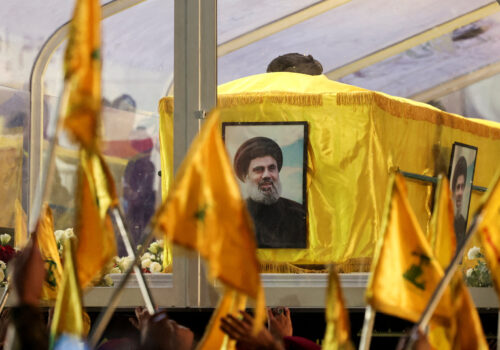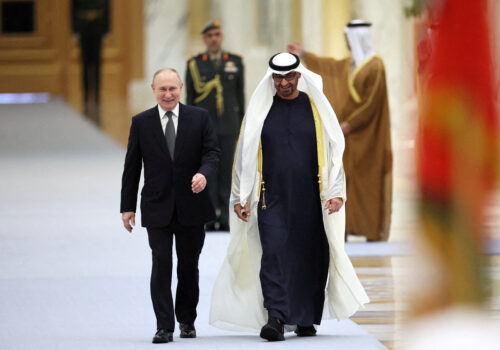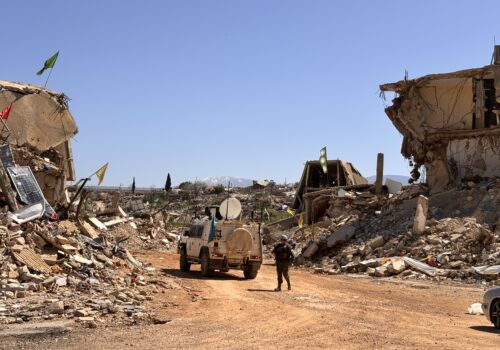Landmark UAE visit highlights President Aoun’s catch twenty-two
Lebanon President Joseph Aoun’s visit to the United Arab Emirates, the first such official visit in years, marked a new step in Beirut’s initiative to attract Gulf states back to the country. This latest stop followed visits to Saudi Arabia in March and Qatar in April, as well as plans to visit Kuwait soon.
The primary objective of the Abu Dhabi trip was to restore confidence with the Emiratis after a decade marked by political tensions. From Beirut’s standpoint, the UAE remains a major trade partner, making it a much-needed destination to garner support for Lebanon’s reconstruction, five years after the collapse of its financial system and a few months after the latest Hezbollah-Israel war. The UAE is also the second Gulf destination for the Lebanese diaspora after Saudi Arabia, hosting about ninety thousand Lebanese citizens.
The outcome of Aoun’s visit was modest and reflected that Abu Dhabi remains cautious. Both countries issued a joint statement announcing the end of a travel ban to Lebanon, which the UAE imposed after Hezbollah joined Hamas in the aftermath of the October 7, 2023, attack on Israel that launched the war in Gaza. The two governments will also convene a bilateral business council to discuss potential investments. Meanwhile, the Abu Dhabi Fund for Development will send a team to Beirut to assess the opportunities for joint projects, and the UAE’s “Knowledge Exchange Office” is planning to support government reforms.
SIGN UP FOR THIS WEEK IN THE MIDEAST NEWSLETTER
Despite these deliverables, Abu Dhabi refrained from announcing an investment package or an aid program with Lebanon. There was also no statement regarding the UAE’s financial support for the Lebanese Armed Forces (LAF) or the exploration of Lebanon’s gas field—two topics where Lebanon hoped for significant decisions.
Overall, Aoun’s visit aimed to rebuild trust but did not yet confirm the Emirati return to Lebanon. Aoun faced similar challenges in Riyadh, leaving Crown Prince Mohamed bin Salman without a financial commitment. He was more successful during his trip to Doha when the Qatari government announced the renewal of a sixty-million-dollar grant to cover the salaries of the Lebanese Army.
The UAE’s cautious stance regarding Lebanon stems from the desire within Abu Dhabi’s policy circles to assess Aoun’s ability to effect change. This assessment will ultimately influence how much political and financial capital Abu Dhabi is prepared to invest in him, and more broadly, the country.
To be sure, Aoun’s profile is appealing to the Emiratis. The former commander of the LAF became head of state after his election last January, following a three-year institutional crisis that left Lebanon without a president. With the new Prime Minister Nawaf Salam, Aoun represents arguably the best chance Lebanon has had in years to tackle its chronic issues, such as dismantling the paramilitary forces of Hezbollah and combating the corruption that plunged the country into one of the worst financial crises in modern times in 2019.
If successful, Aoun and the new government could become major strategic partners of Abu Dhabi in the Levant. The fact that the Emirates maintain close contacts with Israel could also benefit Aoun in sending messages to the Netanyahu government to allow space—and time—for the Lebanese government to carry out the transfer of power in the south from Hezbollah to the LAF, a primary condition of the ceasefire with Israel and United Nations resolution 1701.
Strengthening the LAF is crucial for reducing Iranian influence within the country and preventing a resumption of war with Israel. A robust Lebanese army is also essential for border security, especially to tackle any clashes arising from neighboring Syria, where the new ruler, Ahmed al-Sharaa, struggles to control sectarian violence.
However, five months into Aoun’s presidency, the situation regarding Hezbollah’s disarmament and the reconstruction efforts has not changed dramatically. In mid-April, Aoun announced, “Hezbollah’s weapons will be withdrawn (…) in 2025.”
But he quickly added that Beirut wants “to withdraw Hezbollah’s weapons, but we do not want to ignite a civil war.”
Like past Lebanese leaders, Aoun does not want to precipitate an internal conflict between Hezbollah combatants and regular soldiers. Memories of Hezbollah taking to the streets of Beirut and occupying the city center in 2008, after the government of then-Prime Minister Fouad Siniora tried to shut down Hezbollah’s private communication network, remain fresh in people’s minds.
In an interview with the Abu Dhabi-based newspaper The National, Aoun suggested that fighters from the Party of God could join the LAF if they agreed to lay down their arms.
Aoun’s message may be encouraging, but for Gulf decision-makers and their Western counterparts, it sounds similar to previous ones they have heard before, including after the Syrian withdrawal from Lebanon in 2005 and following the previous Hezbollah-Israel war in 2006.
For a long time, the UAE and Saudi Arabia played a crucial role in supporting the Lebanese economy. Riyadh was also meant to finance the LAF, until the Kingdom withdrew from the support plan in 2016 over concerns that Hezbollah’s influence within the army compromised the deal. Since then, Gulf investments in Lebanon have decreased, and Gulf tourists who used to flock to fancy hotels on Beirut’s corniche have left.
Unfortunately, without significant support from external partners, the Lebanese government cannot initiate the country’s reconstruction. Lebanon’s infrastructure is in disarray, from its electricity services to its health sector. Earlier this year, the World Bank estimated that reconstruction after the 2024 war requires an investment of eleven billion dollars—for context, the Lebanese state currently operates with a budget of three billion dollars. The World Bank is offering to provide a $250 million loan for the first tranche of the reconstruction, but the rest must come from elsewhere.
Severely weakened by the last Israeli operation, Hezbollah is also unable to fund the reconstruction. However, its leaders can still rally their Shia supporters who are frustrated by the state’s dereliction of duty. The longer the government takes to rebuild the country, the more difficult it will be to maintain the population’s support, giving the militant group more time to regroup and rearm. Furthermore, if Hezbollah’s military presence persists, Israel might find it necessary to resume its air and ground operations in Lebanon.
Ultimately, this presents Aoun with a catch-twenty-two: Lebanon needs the diplomatic and financial support of Gulf states like the UAE to marginalize Hezbollah and improve its economy. However, potential Gulf supporters in Riyadh and Abu Dhabi are reluctant to invest without evidence showing that Aoun and the government can deliver, starting with disarming Hezbollah.
If Abu Dhabi and other Gulf states hesitate to invest in Aoun and the Lebanese government, the latter may need to take a bolder approach and raise its stakes against Hezbollah.
Jean-Loup Samaan is a nonresident senior fellow at the Atlantic Council and a senior research fellow at the Middle East Institute of the National University of Singapore.
Further reading
Tue, Apr 15, 2025
Weakened by Israel, Hezbollah turns to spin games to hold support
MENASource By David Daoud
Hezbollah's more cautious posturing on Israel in recent weeks demonstrates the militant group knows it’s in no condition to fight.
Thu, Apr 24, 2025
Can Russia’s defense sector break through in the Gulf?
MENASource By Jean-Loup Samaan
Despite speculation, the context is even less favorable today for the Russian defense industry to boom in the region than a decade ago.
Tue, Apr 29, 2025
Dispatch from the UN Blue Line: Israel’s ‘systematic destruction’ in Lebanon
MENASource By Nicholas Blanford
If Hezbollah refuses to disarm, Israel would almost certainly escalate its attacks possibly to the extent of resuming the war in Lebanon.
Image: Sheikh Mohamed bin Zayed Al Nahyan, President of the United Arab Emirates meets with Joseph Aoun, President of Lebanon, at Al Shati Palace, Abu Dhabi, United Arab Emirates, April 30, 2025. Hamad Al Kaabi/UAE Presidential Court/Handout via REUTERS THIS IMAGE HAS BEEN SUPPLIED BY A THIRD PARTY



